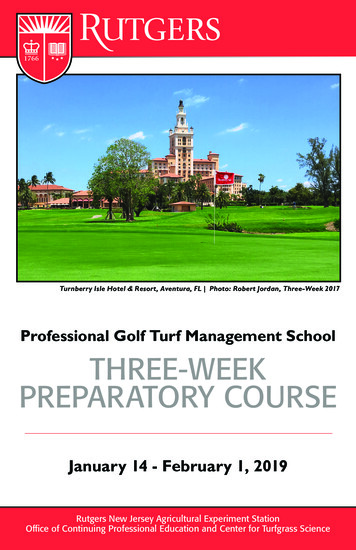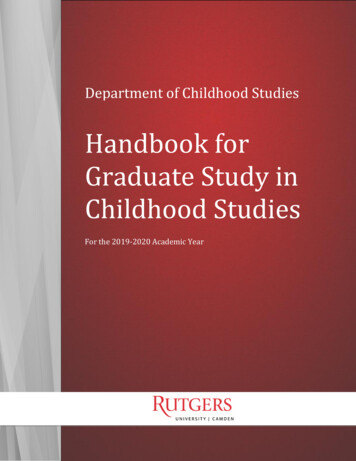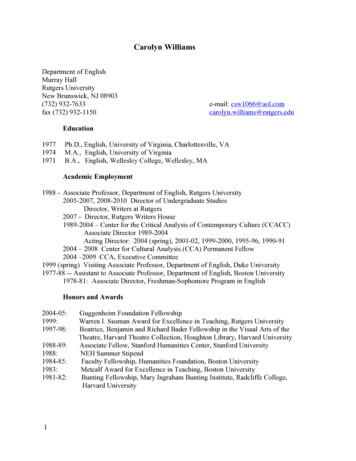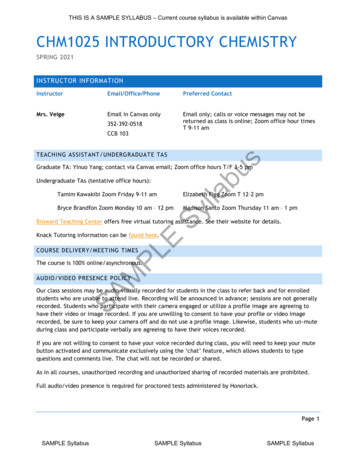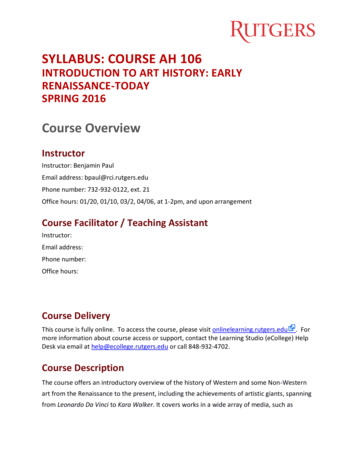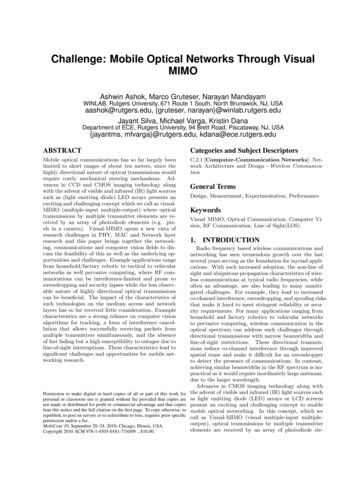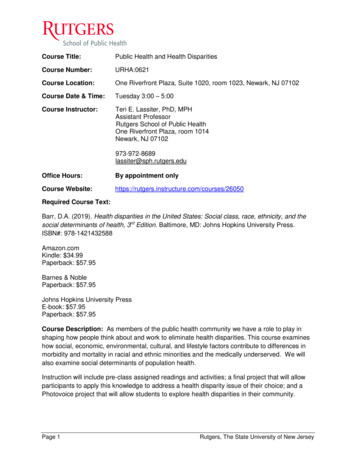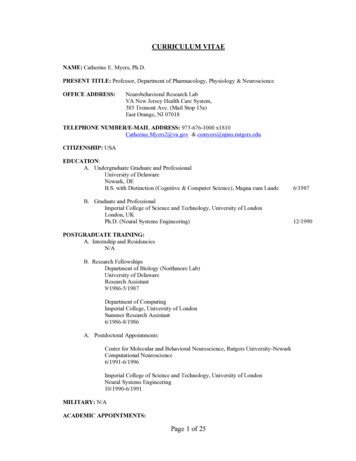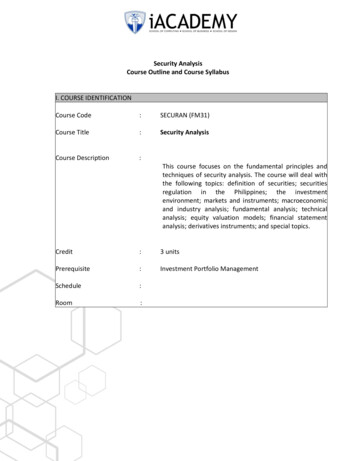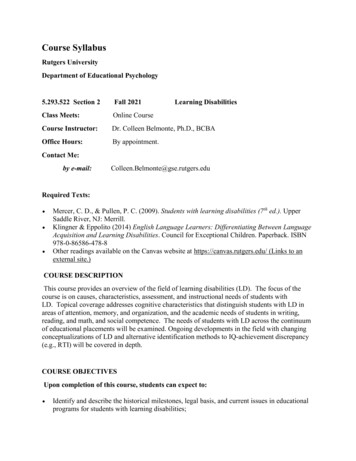
Transcription
Course SyllabusRutgers UniversityDepartment of Educational Psychology5.293.522 Section 2Fall 2021Learning DisabilitiesClass Meets:Online CourseCourse Instructor:Dr. Colleen Belmonte, Ph.D., BCBAOffice Hours:By appointment.Contact Me:by e-mail:Colleen.Belmonte@gse.rutgers.eduRequired Texts: Mercer, C. D., & Pullen, P. C. (2009). Students with learning disabilities (7th ed.). UpperSaddle River, NJ: Merrill.Klingner & Eppolito (2014) English Language Learners: Differentiating Between LanguageAcquisition and Learning Disabilities. Council for Exceptional Children. Paperback. ISBN978-0-86586-478-8Other readings available on the Canvas website at https://canvas.rutgers.edu/ (Links to anexternal site.)COURSE DESCRIPTIONThis course provides an overview of the field of learning disabilities (LD). The focus of thecourse is on causes, characteristics, assessment, and instructional needs of students withLD. Topical coverage addresses cognitive characteristics that distinguish students with LD inareas of attention, memory, and organization, and the academic needs of students in writing,reading, and math, and social competence. The needs of students with LD across the continuumof educational placements will be examined. Ongoing developments in the field with changingconceptualizations of LD and alternative identification methods to IQ-achievement discrepancy(e.g., RTI) will be covered in depth.COURSE OBJECTIVESUpon completion of this course, students can expect to: Identify and describe the historical milestones, legal basis, and current issues in educationalprograms for students with learning disabilities;
Understand the current educational definition of individuals with LD, including identificationcriteria, labeling issues, and current incidence; Understand the psychological characteristics of students with LD across the lifespan,including intelligence, perception, memory, metacognition, attention, and languagedevelopment; Understand the academic characteristics of individuals with LD in reading, written language,and mathematics; Understand the social-emotional characteristics of individuals with LD, including emotionalself-awareness and self-regulation, self-concept, social imperceptiveness, and learnedhelplessness; Identify and describe basic research supported instructional strategies and practices forteaching individuals with LD; Identify relevant professional organizations, governmental agencies, and advocacy groupsrelevant to providing services and supports to individuals with LD, as well as related journalsand Web-based resources.SPECIAL EDUCATION MASTERS PROGRAM GOALSLearning Goal 1: Attain mastery of the essential aspects of practice and research in the field ofspecial education.Learning Goal 2: Attain in-depth understanding of Council of Exceptional Children (CEC)professional standards and code of ethics for special education professionals.Learning Goal 3: Further develop critical professional dispositions that help educationprofessionals promote improvement in the lives of their students (commitment to ongoingprofessional development, using data-informed approaches, collaborative approaches,developing cultural competencies, etc.)Learning Goal 4: Prepare to be professionals in special education or closely allied professionalfields or to further advance in their professional work.COURSE CATALOG DESCRIPTION15:293:522. Learning Disabilities (3) Origins of the concept of learning disabilities (LD).Cognitive and neuropsychological test patterns as LD indicators. Emphasis on cognitivecharacteristics that distinguish students with disabilities in the areas of reading, mathematics,attentional processes, organization for learning, and executive functioning. Influence ofemotional and sociocultural factors on self-image and academic performance.GRADING POLICYEvaluation of your performance in this course is based on the percentage of total points that youearn in the course. Course assignments have been assigned a point value and the total number ofpoints will be used to calculate the final grade. Late assignments will only be accepted with the
permission of the instructor. Online activities are based on assigned readings; as a result, it isimportant that students keep up to date on their reading.These number grades will be converted to letter grades as follows:90 - 100% A87 - 89% B 80 - 86% B77 - 79% C 70 - 76% C60 - 69% D59% and below FONLINE COURSE POLICIES AND PROCEDURESStudents should be comfortable in an online environment. Specifically, students should be ableto use basic computer and Internet tools such as Word Processing, Power Point, Canvas, andemail. If you need additional support, you can contact the Canvas help desk at:help@Canvas.rutgers.edu.CLASS FORMATThe primary method of instruction in this course will be online, which will include readings,class discussions, assignments, and presentations.OVERVIEW OF COURSE ACTIVITIESThe course includes extensive readings, student led presentations on the readings, a midterm, anda series of homework assignments.Required ActivitiesDue DatePoints AvailableParticipationweekly10Group presentationTBA15Homework assignments (4)TBA60Midterm10/18/2125
PoliciesAcademic Integrity: I expect that you will comply with standards of academic integrity (that is,you will not even think about cheating) in this course. If you need assistance in understanding anassignment or course content, please seek assistance from other appropriate resources orme. Assignments, however, should be your own work, except in cases where I have required agroup product. The consequence for violating policies of academic integrity and other elementsof the student code of conduct are serious and can have a tremendous negative impact on youracademic progress and future career. You should not turn in the same work in two separateclasses without the specific written approval of the faculty members involved. Leaving workuntil the last minute can increase the temptation to plagiarize work from journals or “borrow”friends’ work. You can avoid problems by getting your work done early. Exams are also yourown work. The Office of Student Conduct supervises issues related to violations of academicintegrity. Please familiarize yourself with the university policy on academic icy-on-academic-integrity (Links to an external site.)).Attendance: Attendance at all regularly scheduled classes is required in accordance with theuniversity’s attendance policy. Excused absences include absences due to religious observance(please let me know before the holiday), travel on university business (e.g., sports team), andproperly documented illnesses. Students who were frequently absent last semester did not do aswell in the course as those who were regularly in attendance. Attendance will be monitored bythe professor as well as in-class assignments that students will turn in and these will also functionas a record of attendance.Missed Classes: It is your responsibility to get notes, including handouts, from another studentif you miss class.Grading Policy: Grades are assigned based on a points system described previously.Policy on Late Assignments: Assignments must be submitted on time. Late assignments will beaccepted if you have discussed your reasoning with me, but the grade will be reduced.Classroom Culture: Please turn all cell phones to SILENT during class. Please refrain fromsending text messages during class. If you bring a laptop to class, I expect that you will use it forthe purposes of the class ONLY. In other words, please do not use your laptop to surf the web orcheck email. I expect that all of us (instructor included) will treat one another with respect andhave a pleasant learning environment.Problems?Personal problems.A variety of resources are available at the university to assist you withpersonal difficulties (e.g., stress, anxiety, bereavement, etc). Each campus has a counselingcenter and these services are free to you as a student. Please seek assistance as early as you canso you can maintain a good academic performance.
Academic problems.If you are having difficulties with this course, you should seekassistance from me during office hours or by making an appointment with me.ACCOMMODATIONS FOR DISABILITIESStudents requiring accommodations related to disabilities will be provided all necessary supportsand accommodations. In such circumstances, students should make sure that they communicatetheir needs in advance to the instructor in coordination with the Rutgers Office of DisabilityServices to ensure that they receive appropriate supports commensurate with their needs. Astudent with special needs should contact the office of Disability Servicesat https://ods.rutgers.edu (Links to an external site.).ASSIGNMENT/GRADING REQUIREMENTS: ADDITIONAL DETAILS1. Class discussion/ Weekly Participation: Each student must make an initial post for eachquestion no later than 11:59 p.m. on Monday. Each post must be thorough, answer thequestions fully, and demonstrate that you have completed the reading assignments for theweek. You must follow the directions for each week and make comments to the postingsof two classmates.2. Homework assignments. Students will be assigned FOUR (4) graded homeworkassignments. The purpose of the homework is to help students bridge research to practice,especially connecting learning in prior assessment and methods courses, practica/studentteaching experiences, to more advanced knowledge of LD gained in this course. Duedates are posted on the schedule below. Students will receive a written guidance sheet foreach homework assignment, which will be posted on Canvas. Please submit thehomework in Assignments no later than 4pm on the due date.3. Presentation. Each person will present one of the readings from the course. During thesecond week of classes, I will organize groups and determine the schedule ofpresentations. Additional assignment information will be available in a Canvas Module.4. Midterm (10/18): This will consist of short answer and multiple-choice questions andwill be designed to last about an hour.SCHEDULE OF WEEKLY READINGS AND CONTENT COVERAGESESSIONCONTENT COVERAGE#1 Sep. 6· Course Introduction/Overview of LD· Medical aspects of LD· LD and Cultural IssuesREADINGSMercer and Pullen Chapter 1Mercer and Pullen Chapter 2Kalyanpur & Harry (2012) Cultural Underpinnings of SpecialEducation (pp. 3-14)
· Early Identification and2 Sep. 13 Intervention· AssessmentMercer and Pullen Chapter 13 & 4Fuchs & Deschler: What We Need to Know About RTI (2007)Response to Intervention and the Identification of SpecificLearning Disabilities (Reschly, 2014)· RTI, MTSS, and EvolvingViews of LD3 Sep. 20Pullen et al. (2019) RTI & MTSS: How Do They Differ andHow Are They The Same, If At All?New Jersey NJTSS**HW # 1 assigned (due 10/4) Website https://www.nj.gov/education/njtss/ (Links to anexternal site.)IRISModule https://iris.peabody.vanderbilt.edu/module/rti01/ (Linksto an external site.).· Working with Families4 Sep. 27· Adolescents withLDMercer and Pullen Chapters 12 & 14*McCollin & Obiakor: Transition: Why it does not work (2010)· Transition Programming5 Oct. 4· Social-Emotional-Behavioral Mercer & Pullen Chapter 11IssuesSocial Competence/Social Skills of Students with LD:**HW # 2 assigned (due 3/22) Interventions and Issues**HW1 due6 Oct. 11· ADHDMercer & Pullen Chapter 3ADHD-Pfiffner & DuPaul, Chapter 24 (2014)Website review (pbisworld.com, behaviorbosses.com)
· Theory & PracticeAddressing LD7 Oct. 18· Educational Settings &Services·8 Oct. 25Instructional ModelsMercer & Pullen Chapters 5 & 6Cooperative Learning in Inclusive Classrooms****MIDTERMHandbook of LD-Chapter 12: Memory difficulties in children· Cognitive, Metacognitive, and and adults with learning disabilitiesMemory Issues with LD*Butler (2015) Chapter 28- Metacognition and Self**HW # 3 assigned (due 11/22)Regulation in Learning**HW 2 due9 Nov. 1· Spoken LanguageMercer & Pullen Chapter 7*Child and Adolescent Development for Educators Chapter 7(Language Development)Early Language Development and Language LearningDisabilities10 Nov. 8· ReadingMercer & Pullen Chapter 8*2012-RAN and Reading FluencyMercer & Pullen Chapter 911 Nov. 15· WritingWant to Improve Children’s Writing?*Effective Writing Instruction Across the GradesHarris, Graham,& Mason: Self Regulated StrategyDevelopment (2003)
12 Nov. 22 · ELLs**HW # 4 assigned (due 12/6)Klingner & Eppolito (2014) English Language Learners:Differentiating Between Language Acquisition and LD(Booklet)**HW 3 dueMercer & Pullen - Chapter 1013 Nov. 29· MathematicsHandbook of LD (2013)- Chapter 21: InstructionalIntervention for Students with Mathematics LearningDisabilities*Balancing Perspectives on Mathematics InstructionWatch this short video:UDL At A Glance (Links to anexternal site.)UDL Guidelines.pdfUsing UDL to Design Standards Based Lessons.pdf14 Dec. 6· Access to the general education **HW 4 duecurriculum·VISIT THIS SITE AND EXPLORE AT LEAST olkit/home (Linksto an external site.)NOTE: This last item connects to the required DiscussionPrompt #2 for this week where you need to discuss whatyou consider to be the most valuable tech "tool/resource"for teachers.Universal Design for Learning –Delaware
SKIM Checkpoints 1.1 to 9.3(EXPLORE 1 link from each of 9 xamples (Links toan external site.)
Course Syllabus Rutgers University Department of Educational Psychology 5.293.522 Section 2 Fall 2021 Learning Disabilities Class Meets: Online Course Course Instructor: Dr. Colleen Belmonte, Ph.D., BCBA Office Hours: By appointment. Contact Me:

